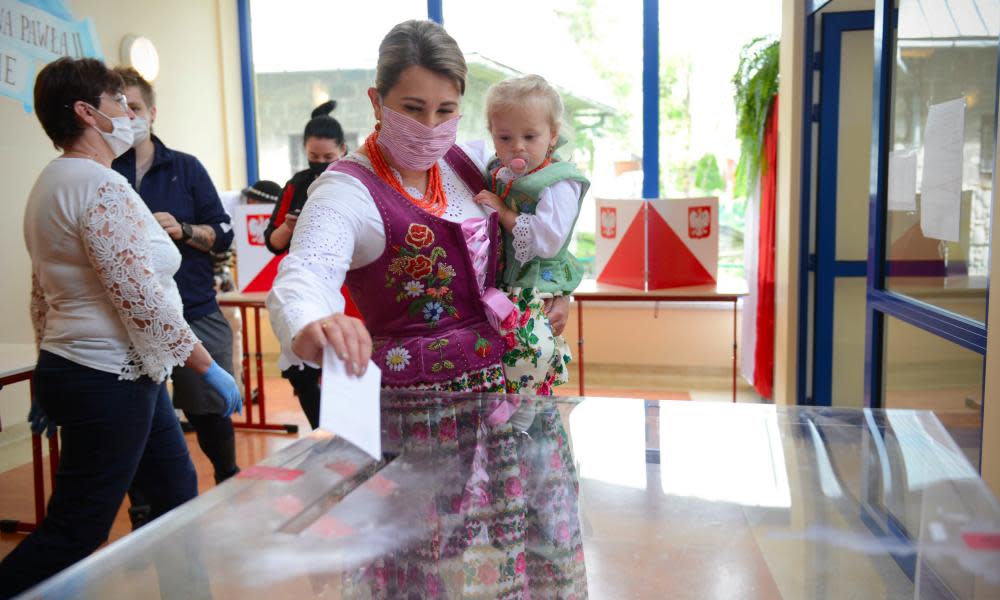Poland's presidential election too close to call as voting under way

Voting is under way in Poland’s presidential runoff, which pits the populist incumbent, Andrzej Duda, against the liberal mayor of Warsaw, Rafał Trzaskowski. The outcome will have a huge bearing on the country’s future political trajectory, and polls suggest the result could go either way.
Duda is allied to the ruling Law and Justice party (PiS), and a win for him will give PiS control of most of the levers of power for several more years, allowing it to continue an agenda that has eroded the rule of law and judicial independence, putting Poland on a collision course with the EU.
Duda’s campaign has been laced with homophobic rhetoric, as he turned the fight against so-called “LGBT ideology” into one of his main talking points.
If Trzaskowski wins, he would be able to use the presidential veto to stymie the PiS legislative agenda, as well as portray a more liberal and pro-EU face of Poland to the outside world.
The two 48-year-olds emerged from a first-round field of 11 candidates, all of them male. Duda won 43.5% of the vote while Trzaskowski got 30.5%, but the challenger is expected to win more votes that originally went to other candidates, potentially leading to a tight run-off. Most recent polls have put the two within a percentage point of each other, well within the margin of error.
The race is so close that small margins could be decisive. There have been concerns that many Poles living abroad have not been able to vote because postal ballots arrived too late. In the first round, Trzaskowski won 48.1% of votes cast by Poles abroad, while Duda won 20.9%.
Trzaskowski has claimed this is the last chance to reverse the democratic backsliding that has taken place during the last five years of PiS government. “It’s now or never,” he said earlier this week. The ruling party will either “continue to destroy independent institutions, further try to politicise courts, destroy local governments and threaten the freedom of the media, or we will have a democratic state where the president restores the balance”, he said.
Duda has portrayed himself as a president who has improved the country’s economy as well as one who would defend “family values” at the expense of LGBT rights. PiS has combined rightwing social and cultural policies with increased state disbursal of money in recent years, which has proved a winning combination in small towns and villages.
“This election will decide Poland’s development in the future, whether it will continue on the path to development,” Duda said earlier this week.
In Otwock, a town of 35,000 inhabitants outside Warsaw where Duda won a plurality of votes in the first round, it was clear that Duda’s anti-LGBT campaign had resonated with some voters.
“I voted for Andrzej Duda because he supports families”, said Kamila, 37, a mother-of-one who said she had not taken any interest in politics before the birth of her young son. “It’s not about finances, it’s about family values, I am not one of these rainbow flag people and I don’t want our children to be forced to learn about ‘genderism’ and these strange kinds of things – I really don’t like it.”
In the small town of Karczew, there were similar sentiments from some voters, who had just finished Mass and were heading to polling stations. “My candidate is the current president,” said Marcin, 39, the church organist. “I’m against the promotion of homosexual unions and these kinds of things because family is the bedrock of this country.”
However Ewa, a pensioner who had also just been to Mass, said that although she did not identify as a liberal, she would be voting for Trzaskowski out of concern about the ruling party’s dramatic accumulation of power since it was first elected in 2015. “I am against all of the power in this country being concentrated in the hands of one party. I survived communism, when one party had all the power,” she said.
Distaste for PiS was a common theme among Trzaskowski supporters. “We want to have peace, to be governed by cultured people, not by the boorish thieves that we have now,” said Barbara, a pensioner in Otwock.
The election was meant to take place in May, when Duda was riding high in the polls and was expected to win easily. However, with coronavirus restrictions in place, plans for a fully postal vote were abandoned by the government a few days before the election as impossible to implement. Instead, a new date was set in late June.
Poland has had 37,000 confirmed coronavirus infections and 1,600 deaths, but restrictions have been largely eased in recent weeks, with bars and restaurants reopening. Voters will have to wear masks and gloves and maintain social distancing.
The prime minister, Mateusz Morawiecki, said this week coronavirus was “retreating” and urged everyone to vote, with people over 60 told they can vote without queueing.


